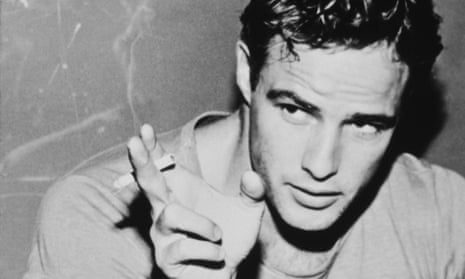Despite his towering public profile, Marlon Brando was a deeply private man. Yet in the documentary Listen to Me Marlon, the actor lowers his defences to reveal his innermost thoughts. Director Steven Riley’s film is a fascinating collage which profoundly probes its subject’s psyche. Given his reluctance to talk to the press in his later years, it’s unlikely that Brando, who died in 2004 aged 80, would have relished the results of Riley’s labours.
Yet Riley’s film is no tabloid feeding frenzy: it was commissioned by Brando’s own estate, and is entirely constructed of hundreds of hours of audio recordings, made by the actor himself. It’s doubtful that Brando ever thought the revelatory tapings would one day provide fodder for a documentary, but thanks to his recordings Riley has managed to construct a tribute to the actor that his fans have long deserved.
Riley opens his film eerily, with a digitised 3D image of Brando’s head that the actor made for himself in the 1980s, speaking sections from the tapes. It sets the tone for the film, which overwhelmingly draws on the effect of the actor speaking beyond the grave. There are no talking heads in Riley’s film, no re-enacted moments from his life – just scenes from Brando’s work laced with archival interviews in which the actor discusses his life in that melodious, mumbling, unmistakable voice.
The film is largely told chronologically, tracking Brando’s move to New York at an early age (“I remember getting drunk, lying on the sidewalk and going to sleep,” he says) to study with legendary acting teacher Stella Adler; his first Oscar win for On the Waterfront, which he reveals he didn’t feel he merited; his later Oscar win for the Godfather, which he boycotted (sending Sacheen Littlefeather to collect the award as a protest against the portrayal of Native Americans in Hollywood films); his life as a womaniser who fathered at least 11, and perhaps as many as 16 children (“I was young and destined to spread my seed far and wide,” he explains); and the family tragedy that befell the actor in his later years, when his son Christian shot and killed the boyfriend of his half-sister, Cheyenne.
Interspersed throughout are musings made by Brando on the nature of performance, which prove exactly how deeply invested he was in his art. For all the eccentricities and bizarre career choices, not to mention the sizzling good looks of his early years, Brando didn’t wear the moniker of the “greatest living actor” lightly. Riley’s film makes explicitly clear how seriously Brando took his craft.
- Listen to Me Marlon opens in New York 29 July and Los Angeles 31 July, before rolling out nationally throughout the summer and fall. It will air on Showtime following its theatrical run

Comments (…)
Sign in or create your Guardian account to join the discussion